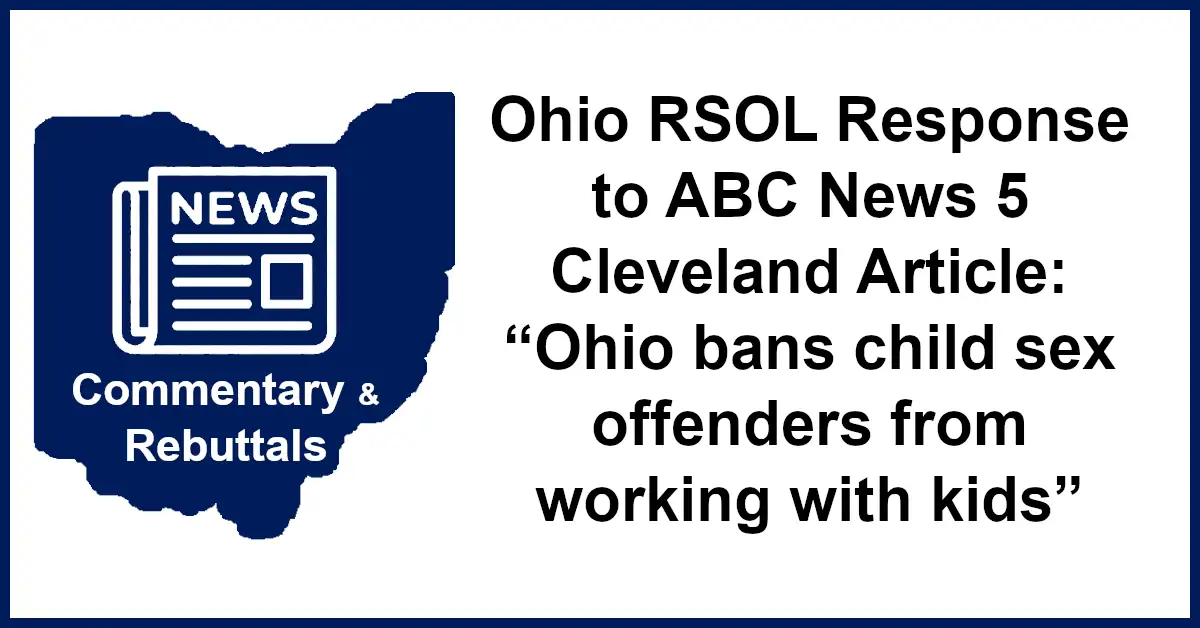by Barbara Wright, Legal & Legislative Liaison, OHRSOL
Ms. Trau:
As the legal and legislative liaison for Ohio Rational Sexual Offense Laws, or OHRSOL, I urge you to get your facts straight. SB 16, as enrolled, does NOT prohibit “child sex offenders” from working with children: the bill was amended this fall after OHRSOL demonstrated the catastrophic effect such an overbroad, overly vague restriction would have on the families of persons previously convicted of a sexual offense. Existing restrictions, together with the availability of background checks, online registration data, and the false narrative surrounding sexual offenses, and persons who commit them, already restrict these persons from any type of meaningful employment. See CIVICC.com showing the hundreds, if not thousands, of professional licenses and employment opportunities that are already prohibited. That leaves retail and manufacturing, both low-paying occupations which would have been prohibited by HB 459 in its original form. Courts have ruled similar restrictions unconstitutional, and unenforceable because of the burdens they would impose on the persons, and their families, without evidence of risk. See Smith v. Doe, 6th Circuit Court of Appeals.
I protest the following assertions in your article:
- The use of the term “child sex offender.” What does this label mean? Persons who commit sexual offenses are a heterogeneous group, with widely varying risk and needs; most will never commit a new offense. We must utilize existing risk assessment tools to determine which of the 10-12,000 persons who may be affected by this legislation are a potential risk to our children, instead of lumping them all together. Our current system creates a false sense of security and the illusion of control, and may create more harm than good.
- Recidivism data shows that the recidivism rate for persons who commit a sexual offense is lower than for any other offense except murder. Yet we provide second chances to drug dealers, who go on to sell drugs to our children. Did you know that the original concern came from a parent in Salem who put Mr. Seconds Snack Shop out of business after she discovered his past convictions for a sex offense? Neither the bill sponsor, nor any other witnesses, demonstrated any research to show that Mr. Seconds committed a new offense as a result of the “crisis” you refer to. Yet the same parent was comfortable with the existence of a drug treatment facility right down the street. Is it a crisis? Or pure speculation based on the politics of fear created by politicians and irresponsible journalists?
- Your assertions regarding tier levels are also inaccurate. The Adam Walsh Act tier levels lead the public to believe that a person convicted of a “Tier I” offense is at lower risk to reoffend; in fact, no risk assessment is ever done to establish the risk and needs of any person convicted of a sexual offense. Instead, persons are labeled based upon offense, not the risk they pose to children. So here are the facts: Tier I includes unlawful sexual conduct with a minor as young as 14, if the offender is less than four years older, and there was no consent. By comparison, an 18-year old who has consensual sex with a 14-year old, but who is 4 years and a day older than the minor, is required to register for 25 years under Tier II. And the new law does NOT prohibit a person with multiple convictions of rape against adults only from volunteering with minors.
- Evidence shows that the majority of re-arrest and re-convictions occur within 2-3 years after release from prison. During this period, offenders are under intensive supervision, including restrictions against any contact with minors. Why do we feel it necessary to impose post-conviction barriers without evidence that these persons will ever harm a child?
- The suggestions made by Ohioans for Child Protection are good ones, as long as they are based on wrongful behavior, and not speculation. Any remedy for child sexual assault must involve education, rehabilitation, and risk assessment to be effective. The 134th General Assembly took steps in the right direction by passing legislation requiring education on sexual assault in our schools. We must provide our children with the tools necessary to identify and report inappropriate behavior.
- I find it interesting that there was no testimony in support of HB 459, except the Ohio Prosecuting Attorneys Association. If this is such a “crisis level,” where was Ohioans for Child Protection when the bill was being heard? Where was law enforcement, or the parents in Salem, Ohio? Those witnesses were notably absent.
So where does that leave us? SB 16, as enrolled, will prohibit parents from meaningful opportunities to participate in their children’s lives, without evidence that they pose any risk to children. Our children will continue to be exposed to the greater risk posed by persons the child knows, including family members and trusted neighbors and friends. SB 16, and all the misguided legislation in the world, will not prevent that abuse.


